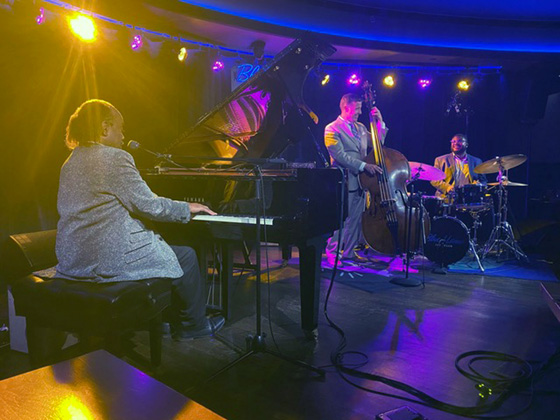
Johnny O’Neal’s Return to the Blue LLama Jazz Club
It has been some time since pianist and singer Johnny O’Neal has been in our area. There was a time when the Detroit-born artist regularly visited Ann Arbor venues such as the Bird of Paradise, the Firefly, and the Kerrytown Concert House, or Rusty’s and Murphy’s Place in Toledo. It was a pleasure to hear him back again, this time at the Blue LLama, in a trio with area masters bassist Jeff Pedraz and drummer Michael J. Reed, who provided nuanced support and solos; indeed, were it not for O’Neal’s admiring comments, one would have thought that they had been with him on a regular basis.
O’Neal has perfected his stage act and refined it over the years, but he knows myriads of tunes and keeps it fresh and spontaneous so that while it is quite polished it remains loose and enormously entertaining. He began the second set at the LLama with one of his regular pieces, “The More I See You,” with an arrangement that in a sense summarizes much of his approach to making music. Using a medium tempo relaxed loping approach, he sang the lyrics, adding a few raucous asides, and then went though various tempo changes, building intensity, tipping his hat to various mentors and influences such as Oscar Peterson. Another highlight was “Morning,” also from his standard book, played in the manner of the late Ahmad Jamal’s “Poinciana,” to whom he dedicated the performance. He took his time developing the work, demonstrating his virtuosic piano skills, with hints of his gospel roots, his Detroit bop credentials, as well as more progressive post-bop experiences, all woven together in a captivating musical carpet. In addition to complex, swinging modern jazz, we were also treated to some quite raunchy blues, and to a hilarious take on the standard “You Don’t Know What Love Is,” making fun of bad musicians, retitled as “You Don’t Know Where One Is,” at one point lovingly parodying Billie Holiday’s famed version of the tune. It was a generous set and at the end O’Neal got serious again and played a solo version of the Gordon Jenkins classic “Goodbye,” made famous long ago by Benny Goodman. It was piano jazz balladry of the highest order filled with musical ideas that touched many emotions. To me, this should have been the end, but O’Neal chose a different way of ending the set, launching into another bawdy blues, as he became the mailman, with admiring parodies of various people, including Joe Williams and Muhammad Ali. It was a great night of music!